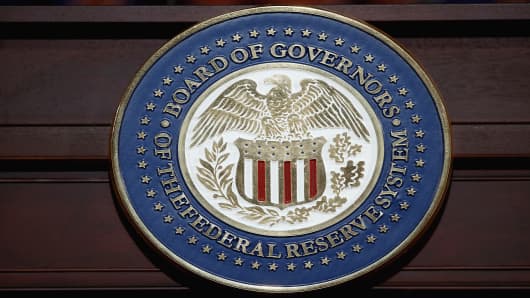Most Fed officials thought interest rates weren't too low at the August meeting, but they also expected their next move would be to boost rates, minutes show.
The minutes, released Tuesday, provide insight into the Fed's thinking at the Aug. 5 meeting, when policymakers decided to hold their key rate steady at 2 percent for the second straight meeting.
Confronted by problems at every turn—rising unemployment, shaky growth, credit troubles and creeping inflation—the Fed took a gamble that once again the best move was none at all.
"Most members did not see the current stance of policy as particularly accommodative, given that many households and businesses were facing elevated borrowing costs and reduced credit availability" due to fallout from financial market strains and economic problems, the Fed's documents stated.
But looking ahead, the next direction for rates is probably up, according to the documents.
"Although members generally anticipated that the next policy move would likely be a tightening," the timing was far from clear and depended on incoming barometers on economic growth and inflation.
Many economists don't believe the Fed will start to push up rates to fend off inflation until next year.
Speaking last week at a high-profile economic conference in Jackson Hole, Wyo., Fed Chairman Ben Bernanke signaled that rates would likely stay at 2 percent at the Fed's next meeting on Sept. 16, and probably through the rest of this year.
Some fear that keeping rates at this level, a four-year low, could aggravate inflation down the road.
At the August meeting, one Fed member—Richard Fisher, president of the Federal Reserve Bank of Dallas—wanted to raise rates.
Fisher favored an increased "to help restrain inflation and inflation expectations, which were at risk of drifting higher," the minutes explained.
Even though financial markets remained fragile and economic growth could weaken further, Fisher "saw a greater risk to the economy from upward pressures on inflation."
But other Fed members generally anticipated that inflation would calm down, although they acknowledged there were risks to the outlook.
That's consistent with the message delivered by Bernanke last week.
The Fed chief welcomed the recent drops in oil and other commodities' prices, and said he believes inflation will moderate this year and next. However, he also warned that inflation outlook remains highly uncertain.
—AP contributed to this report.


